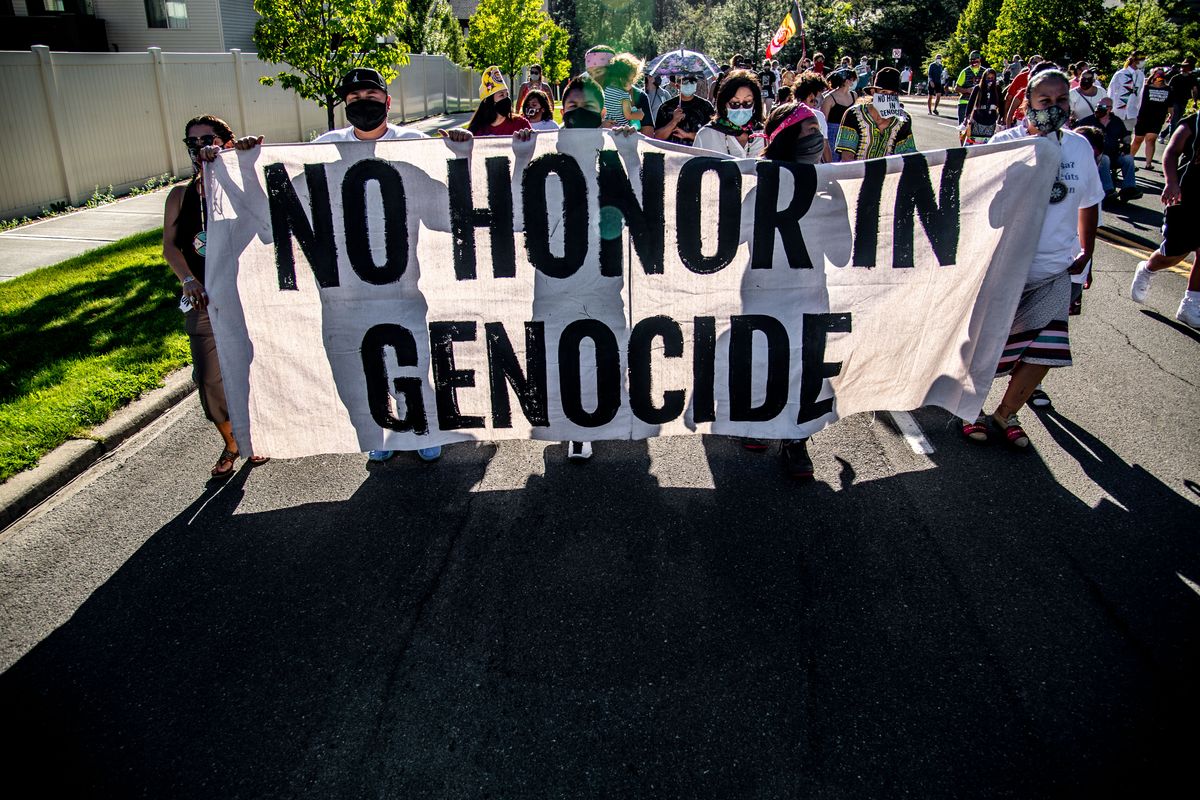‘No honor in genocide’: Native Americans rally to change name of Fort George Wright Drive

In huge letters, the words “No Honor in Genocide” hung on a banner over a teal bus Saturday, where more than 200 people gathered on Fort George Wright Drive, rallying to rename the road.
“Col. George Wright was sent here to rain genocide and terror on our people,” CarylDene Swan, a Coeur d’Alene Tribal council member, said to the crowd, which included several horses, standing in the parking lot of the Unitarian Universalist Church of Spokane. “His only desire was to shoot all humans and destroy all property he couldn’t steal.”
Fort George Wright Drive leads to the historic fort named after Wright, where there also is a monument to Wright. His men, under his orders, slaughtered 800 horses from local tribes on the shores of the Spokane River in September 1858.
Wright then ordered his men to burn down the tribes’ barns of wheat and food. Two weeks later, Wright lured American Indian leaders from the Spokane, Coeur d’Alene and other local tribes under the ruse of a white flag and hanged 17 Native Americans, including the Yakama chieftain Qualchan.
“He said he wanted us all dead, he used every tactic to annihilate us and send us back to the list of extinct people,” Swan said. “But we are still here, and we are stronger than ever.”
Speakers said that young Spokane Native college students attending Spokane Falls Community College, about a block down from the church, should not have to drive to school on a street named for someone who wished their people dead.
Jim SiJohn, a Spokane tribal elder and former tribal council member, took the mic to tell stories from Wright’s reign over Native people’s land. He said he remembered the first time he heard the story of Steptoe Battle, not as it is written in books but as Spokane natives have passed down orally, he said. It was in 1948 in an encampment shared by Coeur d’Alene and Spokane American Indians, his father’s and mother’s tribes.
“I’m gonna say this in English, the language I was forced to learn, so maybe you’ll understand it, the powers that be,” SiJohn said.
He described Native warriors preparing for battle to protect their homes. Warriors, men and women both, took medicines in by the campfire smoke and put on their paint early in the morning. Medicine men and women in the camps prayed for them, knowing many would die, he said.
One woman rode bareback, he said, in and out of battle again and again, carrying the wounded warriors back to medicine men and women. Wright’s men shot her, SiJohn said, but as she lay dying she sang her medicine song.
“Our warriors, they went against rifles and cannons,” SiJohn said. “They ended up fighting with their bare hands. But they fought.”
Much later, others sang their own medicine songs quietly out of fear, SiJohn said, as they walked to the creek now known as Hangman Creek, where they were hanged by Wright’s men.
Wright’s soldiers were cruel, SiJohn said. Native Americans got slim rations. He said in the same area where protesters stood Sunday, soon after Wright’s men took control, a Native boy was picking berries.
“That little boy was minding his own business, just a little guy picking berries,” SiJohn said. “He was whistling a song.”
A woman riding by on her horse heard his whistling, and thought he was making an advance. She was offended, SiJohn said.
She told the colonel, SiJohn said, and the next day the boy was gone and never seen again.
“I hope as you’re walking here and back, I hope you’re thinking of that little boy,” SiJohn said.
Rev. Todd Eklof, of the Unitarian Universalist Church, said he has thought about the disgrace of the road’s name for years.
“We’ve tried so many times in the past to make change happen, but this feels different, like a different time,” Eklof said.
In 1987, a class of North Central High School students said they were disgusted when they learned of Wright’s 1858 campaign.
One junior at the time, Gary Thompson, said people like Wright should be “thrown in jail, not have landmarks named after them.”
Steve Parker, an artist who projected the words “No honor in genocide” and “Native Lives Matter” on the Spokane County Superior Court house Saturday night, said he’s been aware of the road since he moved to Spokane about 40 years ago. Now, he said he’s tired of driving on a road named for a “war criminal.”
Parker said the story of George Wright belongs in a museum, not on a street sign that honors him.
He said the United States could take a nod from Germany, where there are no monuments to Nazi leaders, but Germans are “ardent about teaching about the errors and sins of the past.”
Eklof said changing the road is one step, but Spokane needs to continue to right historical wrongs and recognize how racism prevails in our community.
The description for the event on Facebook called for the immediate change of the road’s name, though it did not demand a replacement name.
“Through lies, manipulation and massacre, this evil man terrorized the first people of this land and their horses,” the post reads. “His name on our streets is a constant reminder of the lives he took and the pain he caused.”
Maggie Quinlan can be reached at (509) 459-5135 or at maggieq@spokesman.com